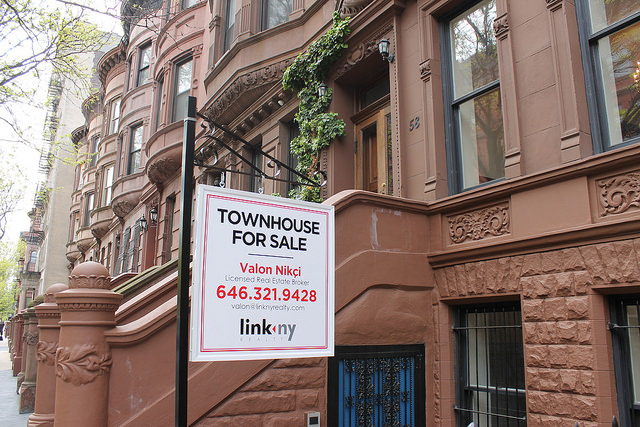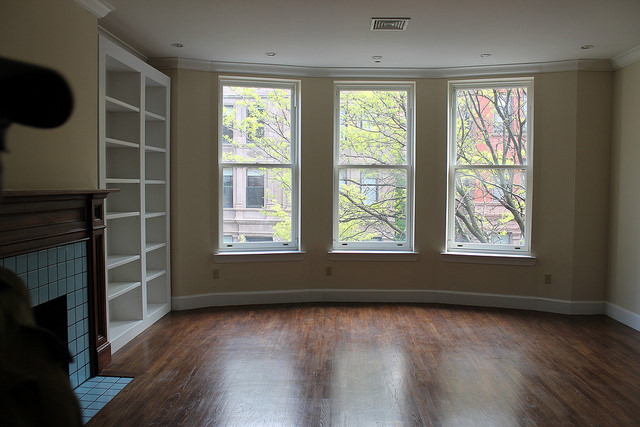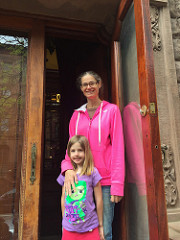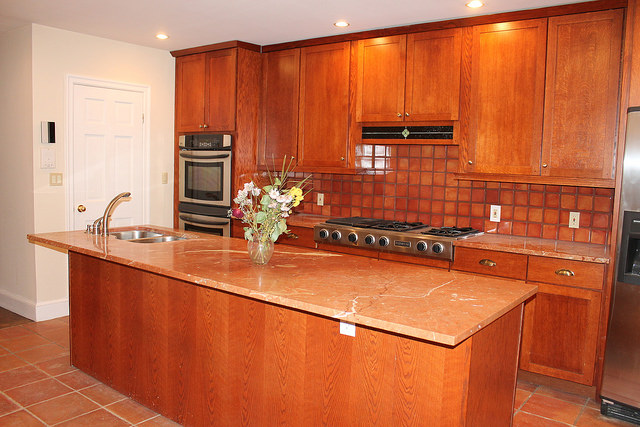
By Karis Rogerson
On a peaceful block of brownstones in West Harlem, an unassuming sign in front of 58 W. 120th St. announces that the home is for sale. The house, whose listing price is $4.595 million, has five floors, five bedrooms, eight bathrooms, an elevator, original detailing on the banisters and walls and the echo of Maya Angelou.
That’s because this home in Mount Morris Park West Historic District, east of Malcolm X Boulevard, belonged to the writer and civil rights activist herself; it is where she kept a suite of rooms, entertained friends like Oprah and cooked meals. The house has been emptied of furniture, but small traces of Angelou remain, from the colors in the bathroom to the 80s-feeling kitchen to the deep red carpet on the staircase in the foyer.
Her personal library is on the second floor, a spacious room with three large windows that overlook the tree-lined, calm street the house sits on. There is an unusable fireplace in the corner, a pretty ornament to enliven the house without actually warming it. On the top floor, two skylights fill the hallway with natural light. In contrast, the basement is lit artificially, a few light bulbs providing a way to see the gently curving arches that hold the ceiling up.
West 120th Street, where the house resides, is itself a popular one, part of a Harlem neighborhood that has seen rising prices and a changing demographic over the past few years, a sign of gentrification that neighbors say is both good and bad.
Angelou’s house has been on the market for a little over two months, according to Valon Nikci, founder of Link NY Realty and exclusive broker for Angelou’s estate. Once sold, it would be the most expensive townhouse ever sold in Harlem, he said. During its two months on the market, “hundreds” of interested people have viewed the house.
“I think it’s one of the best townhouses in the area,” Nikci said. “As I always say, someone who buys this property in a way obtains a cultural history, not just a piece of great [real estate]. I hope someone who buys it will be someone who values and appreciates Maya Angelou and her work and her legacy.”
Angelou originally bought the home in 2002 and it was fully renovated by 2004, when she began to inhabit it. Of course, Angelou’s full-time home was in North Carolina, where she taught at Wake Forest University, but this was her New York home, which she stayed in during holidays and when she was entertaining friends in the city.
By the time she moved in, Angelou was already in her 70s, and many neighbors who were on the block during her visits said that while they saw her about, they never actually met her.
Chrissy Nance, a white neighbor who has lived just a few houses down the street for the past 10 years, said having a celebrity of Angelou’s stature gave the street some “red.”

Maya Angelou’s personal library, which overlooks the street. Photo by Karis Roberson
Nance added that West 120th Street itself hasn’t changed very much over the past few years, but the surrounding blocks and the neighborhood as a whole have definitely experienced gentrification.
“I have mixed feelings,” Nance said about the changes. “It’s really nice that we have some of the amenities that we have now, it feels a little safer, but at the same time I do miss some of the color and flavor.”

Chrissy Nance, who has lived in the neighborhood for 10 years, with her daughter, Gigi.
Photo by Karis Rogerson
Despite that, Nance admitted that she considered her family lucky to live in the area. While she was speaking about having relationships with her neighbors, her five-year-old daughter Gigi came out of the house and began pointing out different homes, naming the children who lived there.
Before moving to Harlem, Nance lived in Union Square for seven years, and said she rarely spoke to her neighbors and only knew what was happening because her doorman kept her up-to-date.
“Here you know your neighbors,” she said. “They shoveled my sidewalks for me…everybody looks out for everybody, and I really understand who are the people in your neighborhood now.”
Regina Caracter, a black woman who has lived in the area since shortly after Angelou’s arrival, agreed that the gentrification is both good and bad. She spoke passionately about the need to allow original residents to remain in the area.
“A lot of people that have lived here are being pushed out,” Caracter said. “It’s good that people are coming in, but you have to remember the people that have been here. The rent is sky-high now. If you’re not already in here, you can’t move in here because it’s too expensive.”
Caracter said she was not necessarily worried for herself because she has lived in the area for a long time and her rent is basically stabilized, but she worries for others.
“Where are people going to live?” she asked. “It has to be a mixture, it can’t be just all rich or high-income people, because that’s not reality anymore. Reality is that all races, all creeds, everybody is struggling right now, so you have to make things affordable.”
Nikci, the broker selling Angelou’s house, said the price on the townhouse was raised by about $1 million simply because of the star power of its previous owner.
“It would kind of break a record, too,” he said of the fact that the townhouse is selling for such a high price. “When we sell this, it will increase the value even more of the properties in the area.”
Prices have already gone up over the past few years. According to Zillow, values of some homes in the neighborhood which were bough in the past few years have increased by anything from $300,000-$1 million.
Nance, who is a homeowner on the street, agreed that the sale of the house will increase the value of other properties.
“With it going for that much, it changes things, it raises the real estate prices, it raises the rent,” she said. “It won’t raise our rent, but it will be a better appraisal for us.”
Many people looking at Angelou’s house want it specifically because it belonged to Angelou, Nikci said. However, for some people the asking price is simply too high. When that is the case, these families turn around and begin looking for another townhouse, but one that is still on West 120th Street.

The kitchen where Angelou used to cook her meals.
Photo by Karis Rogerson
“They specifically want this block because of the value, the park, a few celebrities live on the block, you cannot beat it. Nikci said. “When you’re inside, you feel like you’re in the country but at the same time you’re in Manhattan. If you go into the backyard of these townhouses, it’s very peaceful and very quiet.”
Caracter, who does not own her own home, said that while she likes the positive changes gentrification brings, she is always concerned about how regular New Yorkers will stay in the city.
“A lot of people are moving out because they can’t afford it,” she said. “You’ve got to remember that not everybody’s rich, we’re not born into money.”
Nikci said he is “99.9 percent” certain the house will sell, then added, “We will have a buyer in a matter of days if not next week. [Interested buyers] are a combination of foreigners, locals, nationals and most of them are cash-deal buyers.”
For those wondering why the estate didn’t simply turn the house into a museum, Nikci said that it is complicated to do so, and it would be up to the new owners if they want to transform the home into an Angelou museum. But, he said, that isn’t likely.
“The buyers we have now are people that will live in it and raise a family here,” he said. “I hope and I wish and I’m sure someone who buys it will appreciate the value and the fact that it was her home.”